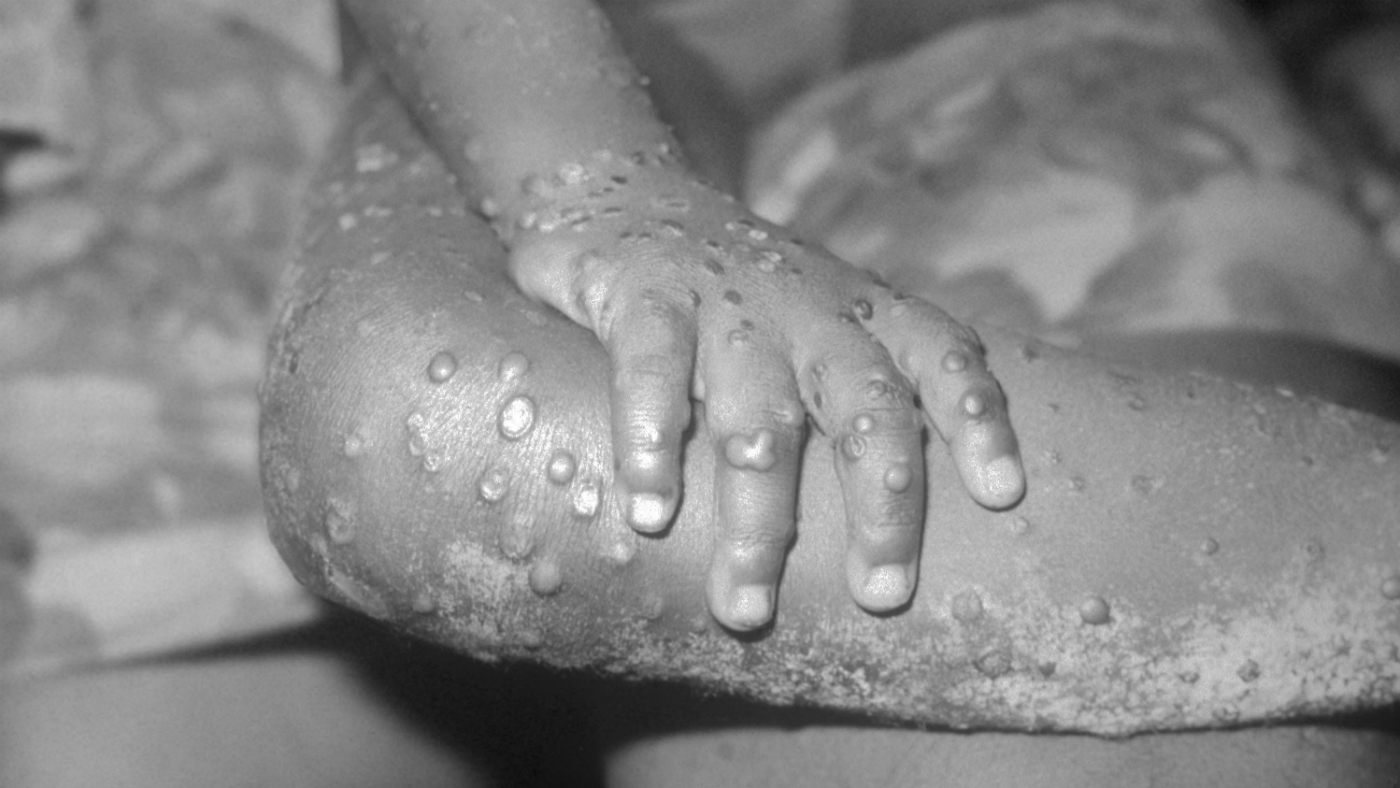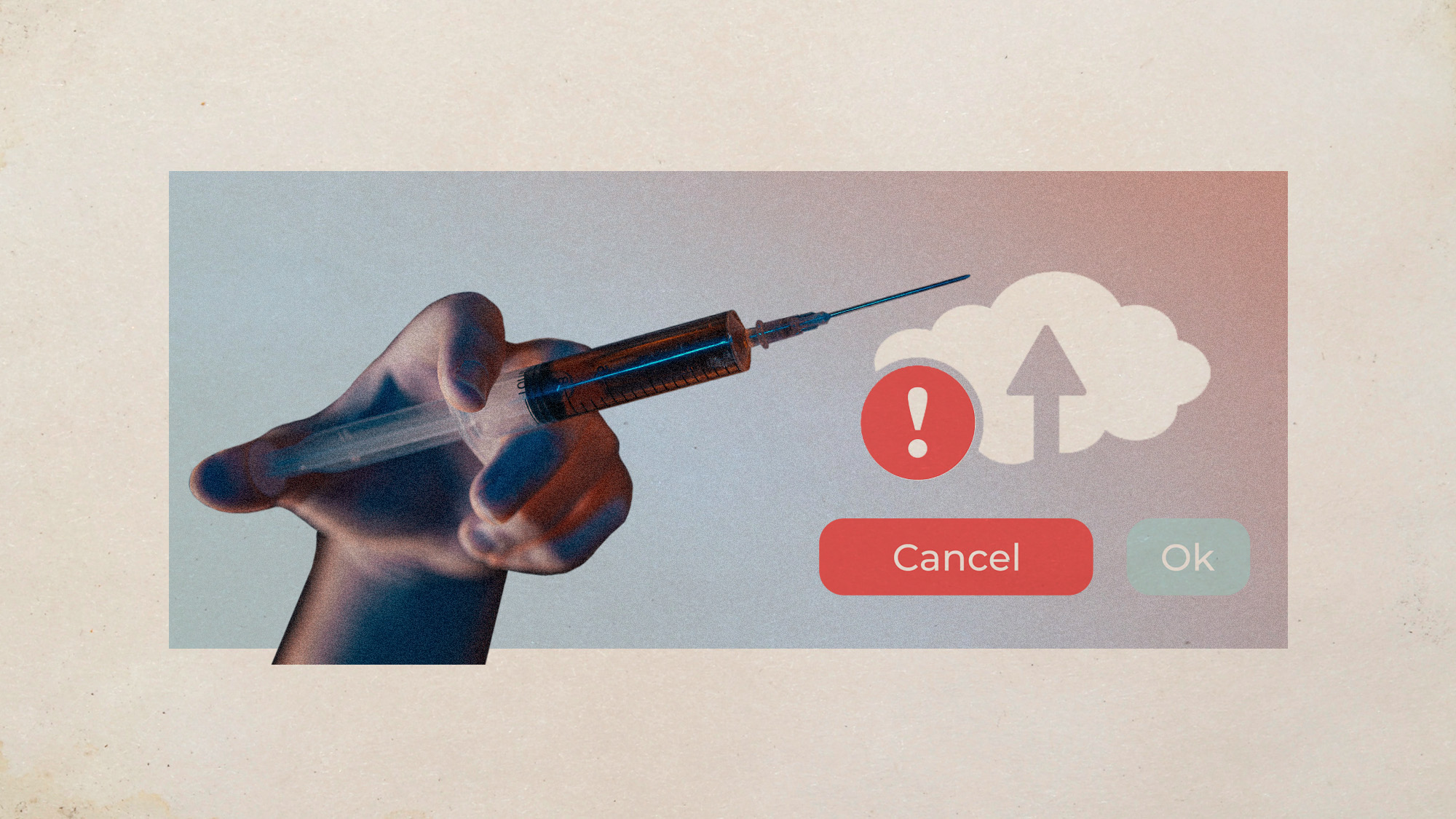Monkeypox: symptoms, transmission and the latest cases
Majority of cases so far have been found in London according to UK health authorities

A free daily email with the biggest news stories of the day – and the best features from TheWeek.com
You are now subscribed
Your newsletter sign-up was successful
The NHS is accelerating its monkeypox vaccination campaign in London after the number of confirmed cases reached more than 2,000 across the country.
A total of 2,137 cases have been confirmed in the UK, with the majority of England’s 2,050 cases discovered in London, according to the latest data.
In response, the UK Health Security Agency (UKHSA) has obtained an additional 100,000 doses of the jab to help tackle the spread of the virus, reported Sky News.
The Week
Escape your echo chamber. Get the facts behind the news, plus analysis from multiple perspectives.

Sign up for The Week's Free Newsletters
From our morning news briefing to a weekly Good News Newsletter, get the best of The Week delivered directly to your inbox.
From our morning news briefing to a weekly Good News Newsletter, get the best of The Week delivered directly to your inbox.
NHS England said thousands more people who are eligible in the capital will be contacted about getting their jab but people should wait to be contacted before coming forward.
The latest
While anyone can contract the virus, “the majority of cases continue to be in gay, bisexual and other men who have sex with men”, said Sky News.
Experts have therefore recommended that gay and bisexual men at higher risk of exposure to the virus should be offered a vaccine against smallpox called Imvanex.
“While the risk of monkeypox remains very low and nearly every case we have seen so far has recovered quickly, over 2,000 people have been affected by the virus,” said Steve Russell, NHS director of vaccinations.
A free daily email with the biggest news stories of the day – and the best features from TheWeek.com
“On the whole, the cases we are seeing are among gay and bisexual men or men who have sex with men, with a significant number coming from London and so it is vital that those who are most likely to get the virus get vaccinated as quickly as possible,” he continued.
Due to a high volume of cases being concentrated in London, additional vaccines will be offered in the capital to halt the spread of the illness.
“Thousands more people will be invited very shortly with the number of clinics expanded too, and as we have done with the most successful Covid vaccination programme in history, the NHS will leave no stone unturned in ensuring everyone who is eligible can get protected,” said Russell
“We are asking people to wait to be contacted and to come forward at the earliest opportunity possible when invited to get vaccinated.”
Efforts to “contain the outbreak are continuing”, said The Guardian, with UK patients isolating in hospital or at home. Their closest contacts are also being told to isolate and avoid contact with vulnerable groups for up to three weeks.
In May, former health secretary Sajid Javid said that “most cases” of the virus found in the UK are mild and that the nation is stocking up on smallpox vaccines to bolster the country’s protection against the illness, the BBC reported.
The intervention came as an assessment published by the European Centre for Disease Prevention and Control (ECDC) warned that the illness could become endemic in Europe.
“Little is known” about the “suitability” of European animal species “to serve as a host for monkeypox virus”, the report said. But “rodents”, and particularly squirrels, “are likely to be suitable hosts” meaning transmission from humans to pets is “theoretically possible”.
“Such a spill-over event could potentially lead to the virus establishing in European wildlife and the disease becoming an endemic zoonosis”, it added, describing the probability of such an event as “very low”
What is monkeypox?
According to the WHO website: “Monkeypox is a rare viral zoonosis (a virus transmitted to humans from animals) with symptoms similar to those seen in the past in smallpox patients, although it is clinically less severe.”
The monkeypox virus was discovered in 1958 when outbreaks of a pox-like disease occurred in monkeys kept for research, says the UK government website’s infectious diseases portal.
The first human case was recorded in 1970 in the Democratic Republic of Congo.
The illness still mostly occurs in “remote parts of central and west African countries, near tropical rainforests”, said the BBC. There are two main strains of the virus: west African and central African.
The latest cases are believed to be the west African strain of the virus, which is “mild” compared to the central African strain, said the UKHSA.
Before this outbreak, the UK had only ever seen seven cases of the virus, according to the government’s website.
What are the symptoms?
Initial symptoms include “fever, headache, aching muscles, backache, swollen lymph nodes, chills and exhaustion”, says the i news site. “A rash can also develop, usually starting on the face before spreading to other parts of the body. It eventually forms a scab, which falls off.”
The US Centers for Disease Control and Prevention says that the incubation period (time from infection to symptoms) for monkeypox is usually seven to 14 days, but can range from five to 21 days. The public health institute adds that in Africa, where cases often go untreated, the disease “has been shown to cause death in as many as one in ten persons” who contract it.
The illness “does not spread easily between people”, said the BBC’s digital health editor Michelle Roberts, but it can be spread in the following ways:
- touching clothing, bedding or towels used by someone with the monkeypox rash
- touching monkeypox skin blisters or scabs
- coming into contact with the coughs or sneezes of a person with the monkeypox rash
Is it a sexually transmitted infection?
The virus is not a sexually transmitted infection. However, the recent surge in global cases appears to have been spread primarily through men who have sex with other men, according to WHO officials. This is because the illness is spread through close contact.
“Many diseases can be spread through sexual contact,” Andy Seale, a WHO adviser on HIV, hepatitis and sexually transmitted infections, told CNBC. “You could get a cough or a cold through sexual contact, but it doesn’t mean that it’s a sexually transmitted disease.”
Dr Susan Hopkins, chief medical adviser at the UKHSA, said that “because the virus spreads through close contact, we are urging everyone to be aware of any unusual rashes or lesions and to contact a sexual health service if they have any symptoms”.
A “notable proportion” of cases in the UK and Europe have been found in gay and bisexual men”, she added, “so we are particularly encouraging these men to be alert to the symptoms”.
Anyone with unusual rashes or lesions on any part of their body, especially their genitalia, should immediately contact NHS 111 or their local sexual health service.
Is this the next Covid?
The risk that monkeypox poses to the public is low, according to the UKHSA, and experts do not believe we are on the verge of a national outbreak.
Despite this being the largest outbreak of monkeypox outside Africa for 50 years, the illness does not spread easily, and so the threat is low compared to the Covid pandemic.
Speaking to the BBC, Jonathan Ball, professor of molecular virology at the University of Nottingham, said: “The fact that only one of the 50 contacts of the initial monkeypox-infected patient has been infected shows how poorly infectious the virus is.”
He added: “It is wrong to think that we are on the brink of a nationwide outbreak.”
Dr Michael Head, a senior research fellow in global health at the University of Southampton, told The Independent that more information was needed on the pattern of transmission, currently believed to be mainly through sexual contact, but said that “it would be very unusual to see anything more than a handful of cases in any outbreak, and we won’t be seeing Covid-style levels of transmission.”
The main reason we shouldn’t worry too much is that monkeypox is also a “known virus” rather than a “completely new coronavirus”, said BBC health correspondent James Gallagher. This means that “we already have tools to help control it”.
The “big challenge” at the moment is identifying the number of cases currently in the UK, he added. The current number is likely to be only “the tip of the iceberg” as “many of the new cases appear unconnected to each other”.
-
 The 8 best TV shows of the 1960s
The 8 best TV shows of the 1960sThe standout shows of this decade take viewers from outer space to the Wild West
-
 Microdramas are booming
Microdramas are boomingUnder the radar Scroll to watch a whole movie
-
 The Olympic timekeepers keeping the Games on track
The Olympic timekeepers keeping the Games on trackUnder the Radar Swiss watchmaking giant Omega has been at the finish line of every Olympic Games for nearly 100 years
-
 High Court action over Cape Verde tourist deaths
High Court action over Cape Verde tourist deathsThe Explainer Holidaymakers sue Tui after gastric illness outbreaks linked to six British deaths
-
 Is the US about to lose its measles elimination status?
Is the US about to lose its measles elimination status?Today's Big Question Cases are skyrocketing
-
 A real head scratcher: how scabies returned to the UK
A real head scratcher: how scabies returned to the UKThe Explainer The ‘Victorian-era’ condition is on the rise in the UK, and experts aren’t sure why
-
 Trump HHS slashes advised child vaccinations
Trump HHS slashes advised child vaccinationsSpeed Read In a widely condemned move, the CDC will now recommend that children get vaccinated against 11 communicable diseases, not 17
-
 Vaccine critic quietly named CDC’s No. 2 official
Vaccine critic quietly named CDC’s No. 2 officialSpeed Read Dr. Ralph Abraham joins another prominent vaccine critic, HHS Secretary Robert F. Kennedy Jr.
-
 This flu season could be worse than usual
This flu season could be worse than usualIn the spotlight A new subvariant is infecting several countries
-
 Bluetoothing: the phenomenon driving HIV spike in Fiji
Bluetoothing: the phenomenon driving HIV spike in FijiUnder the Radar ‘Blood-swapping’ between drug users fuelling growing health crisis on Pacific island
-
 ‘Nightmare bacteria’ are rapidly spreading
‘Nightmare bacteria’ are rapidly spreadingUnder the radar The infections are largely resistant to antibiotics